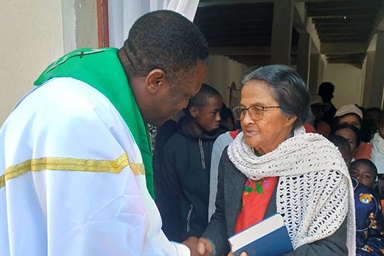The United Methodist Church plans to combat malaria in Africa by using both its own health infrastructure and partnerships with other organizations.
To achieve that goal, the denomination will release funds by the end of this year from its "Imagine No Malaria" initiative to the Geneva-based Global Fund to Fight AIDS, Tuberculosis and Malaria. Last week, funds were authorized for release to the United Methodist Committee on Relief to help with implementing the campaign in Africa.
"We're able to move forward due to the generosity of the people of The United Methodist Church in response to Imagine No Malaria," said the Rev. Larry Hollon, top executive of United Methodist Communications.
The denomination also is a key partner in a national distribution of mosquito bednets in Sierra Leone at the end of November.
The Global Fund will receive the first installment of a $28-million pledge from The United Methodist Church. Fulfillment of that pledge is contingent upon the successful completion of the denomination's goal to raise $75 million and eliminate malaria deaths in Africa by 2015.
Providing training and infrastructure
UMCOR funding will be used to train African health boards providing local delivery systems for malaria prevention, education and treatment. This first step toward an integrated health infrastructure has happened "about two years earlier than we anticipated," said Hollon.
Thomas Kemper, who made the commitment to the Global Fund in October on behalf of the United Methodist Global Health Initiative, said that employing an integrated strategy "is the only way we can fight and beat malaria."
The United Methodist Church is the first faith-based partner of the fund. Kemper, the top executive of the United Methodist Board of Global Ministries, believes the independent organization offers a united approach to the elimination of malaria "which we have not seen before in development work."
In Africa, where 40 percent of the health-care infrastructure is operated by religious organizations, the church has the people and the mechanisms to join in that approach. "It's impossible to really do anything without involving the churches," he said.
Committed to fighting killer diseases
Michel Kazatchkine, executive director of The Global Fund, acknowledged the significant pledge as "a testimony to your church's commitment to fighting the three diseases and improving the health of communities and people in need," in an Oct. 22 letter to Kemper.
"Part of our Methodist DNA" includes a concern for health that was part of the theology of John Wesley, Methodism's founder, Kemper replied.
"Our capacity to make a commitment to the Global Fund is based in our 'connectional' system, also a gift of Mr. Wesley, which links our congregations and institutions in ways that promote common action," he wrote in a Nov. 11 response.
The release of Imagine No Malaria funds through the United Methodist Communications Foundation also supports UMCOR's efforts to overcome malaria. Over the past two years, the church's relief agency has been preparing the denomination's annual (regional) conferences in Africa to take advantage of the Imagine No Malaria funding, according to Shannon Trilli, the agency's director for the Malaria Initiative.
"This has meant we organized, oriented and trained health program bodies, or health boards, that are responsible not only for applying for the funds and directing the malaria strategy in Africa, but also for implementing (and measuring the impact of) the malaria-control projects," she explained.
Through the health boards, African United Methodists are acquiring the skills needed to set the malaria strategy for their continent. Training includes how to apply for funds available in January 2012 manage that money, and execute programs that affect the malaria problem.
UMCOR has supported much of this work for years on a smaller scale, Trilli added. "Imagine No Malaria allows us to scale up our community-based approach to malaria and other diseases and ailments of poverty-all with the goal of reducing maternal and child mortality."
The connections through UMCOR and The United Methodist Church are driving the mosquito net distribution in Sierra Leone at the end of November, Hollon said.
The Sierra Leone effort involves nearly 400,000 nets and 3,700 community health workers. The distribution is being adapted to the Episcopalian "Nets for Life" model, which provides training for community health workers who install nets, educate the families receiving them and bring the net packaging back to supervisors for confirmation that the task has been completed. "They are actually paid for the number of packages they (bring back)," Hollon explained.
Donations to Imagine No Malaria can be made here.
*Bloom is a United Methodist News Service multimedia reporter based in New York. Follow her at http://twitter.com/umcscribe.
News media contact: Linda Bloom, New York, (646) 369-3759 or [email protected].
Like what you're reading? Support the ministry of UM News! Your support ensures the latest denominational news, dynamic stories and informative articles will continue to connect our global community. Make a tax-deductible donation at ResourceUMC.org/GiveUMCom.




